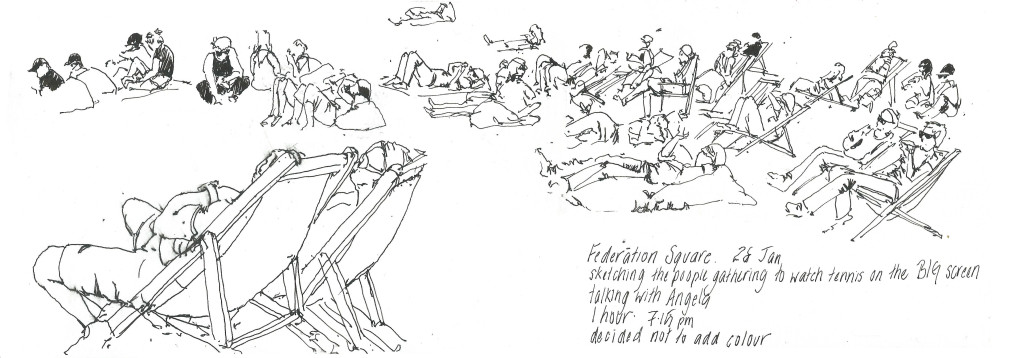
I have thought about this a few times over the last few years in relation to my sketches/drawings and this seems a good opportunity to put my thoughts in order and onto ‘paper’ , so to speak.
My answer to the query was"
“I describe my sketchbooks as sketchbook journals. It is a record of my observances at a particular time and place. It is a record of my life, I have just started my 50th sketchbook journal since Dec 2008. But when it comes down to it I just LOVE TO DRAW, but I like to give it context.”
I have drawn all my life, but only regularly since 2005 (ish), in any sketchbook I could get. I was then using watercolour pencils and ink pens and graphite pencils. I have continued to use these materials, exploring and building on my knowledge of how they work and the effects that can be achieved. Every now and then I splash out and experiment on a large sheet with charcoal or go to a life drawing class, but in general this is my thing!
In December 2008 I bought my first Moleskine Watercolour Sketchbook (13 x 19 cm). This was a watershed moment in my drawing path. There have been many discussions on facebook groups about the format of a sketchbook (landscape/portrait) and what is ‘best’ and the effect on a sketch. I love to use this format and fit my sketches to the format.
I carry my sketchbooks, watercolour pencils ink pen with me everyday, everywhere. Read about what and how I use my drawing material here There is always the opportunity to draw! I also draw longer studies of objects at home in the same sketchbooks.
The most important part of the page is the drawing but I also like to provide a short narrative. These are my journals of my life. I can look back to a date and see what I was doing (or drawing) at the time. I have captured everyday matters, travel and serious illness.
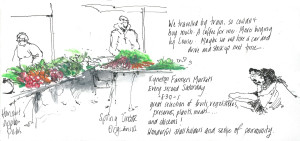
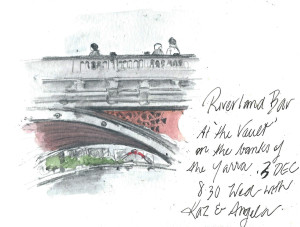
The words are not the focus of the page but provide a context and narrative.
There is an excellent book called Globejotting : how to write extraordinary travel journals (and still have a good time on your trip ) by Dave Fox which provides some ideas about what to write about. But I do not want the words to overtake the page. Although sometimes feel like I have so much to say , that I could write for pages.
- One of my friends thinks I write too much and prefers my pages with few words.
- Another tells me that they can hear my voice in the words on the page and that makes it even more personal and special and enjoys when I write a lot!
- People who do not know me and browse through my sketchbooks often comment on the fact that I write notes and are fascinated by the idea.
- But in the end I ask myself “who are the journals for” – they are for me !
- Colour smudges onto opposite page
- some drawings I am so pleased with that I don't want to "ruin them"
- If I have a particularly special drawing, or heavily coloured drawing that would smudge I put a piece of Baking paper between the pages to protect them.
- I have started drawing subject that I know I have become good at and want to start drawing on separate sheet – feathers, nests and now books. I want to draw them a bit larger than my 13 x 19 journal size and also potentially have them framed for an exhibition, sell prints and cards. One day soon..
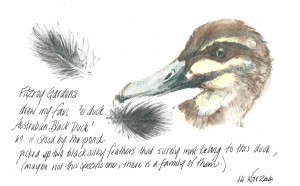

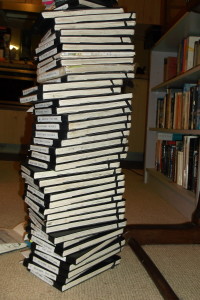
I so agree with you Alissa, a sketch without a story is somehow incomplete. I love looking back through my sketchbooks and finding things I had forgotten. Artists Journal Workshop has changed the way I draw too, so much inspiration coming from all around the world.
ReplyDeleteIf you tell a story with your sketch then you don't need to write anything with the sketch.
DeleteWhat an absolutely brilliant post, Alissa! I'm going to share it on our Facebook group.
ReplyDeleteSometimes I add words, sometimes I don't, it depends on my mood and the image and what's going on. Often I just add the date or location, sometimes small, sometimes very large, as almost a header.
After reading The New Diary by Tristine Rainer, I had a period in which I was tipping in whole pages of writing paper between art paper pages so I could write as much as I wanted! I'm just rereading those now, and I'm delighted I did that, it's been fascinating. I have come a long way in 4 years, and I wouldn't have realized that if I hadn't written it all down.
I tend to write on one side, sketch on the other, but it depends. In my USk journal I write everywhere . . .
ReplyDeleteFantastic post!!! AND AJW has totally changed the direction with what I do on a day to day as well. Thank you all!!!
ReplyDeleteHooray and big hugs, Susan!
DeleteTHANKS so much -- so very much my own issue -- there are images I just want to have blank for use elsewhere -- cards or what -- and yet I want words too -- I still struggle with that ... sometimes I'll sacrifice another watercolor page for writing ... guess it depends ... thanks so much for sharing!! Good topic indeed!
ReplyDeleteWriting a little bit is part of my reflective process. I almost always have something to say (just ask my husband) about my work. However, if I find myself wondering if I should add words I generally leave them out. They have to seem necessary somehow.
ReplyDeleteAgreed, Sharon! Often the image is enough, though I sometimes put just the date, unobtrusively, or maybe the medium since I may forget.
DeleteTerrific post Alissa. Thank You!
ReplyDeleteI discovered your journals when sketch journals were new to me. They inspired me so much, that you could still sketch and write when you were so sick. Writing for me is pretty much integral to the process as well.
ReplyDeleteVery timely, Alissa, as I've been somewhat struggling with this as well. Too much, not enough, none at all? And I came to much the same conclusion as you…the sketchbook is for me and I do what feels right at the moment. GREAT post!
ReplyDeleteFine post! For me, sketchbooks are not journals, but I do I write at least enough to identify the drawing. Where, what time, why... For the same reason, I change the number of a photo to a descriptive name.
ReplyDeleteSometimes that's all I want to do too, Gina! Yesterday I did a watercolor sketch and used the rubber stamp that says "happiness" in Chinese. That's still writing! :D
DeleteOMG! Those would be so great to go back and look through. Yes, they really need the journaling to give the sketches more of a time and feeling perspective...an anchor, if you will, or a memory jog. :)
ReplyDeleteThanks for writing this comprehensive post! I love your sketches and your writing.
ReplyDeleteInspiring as always! :)
ReplyDelete